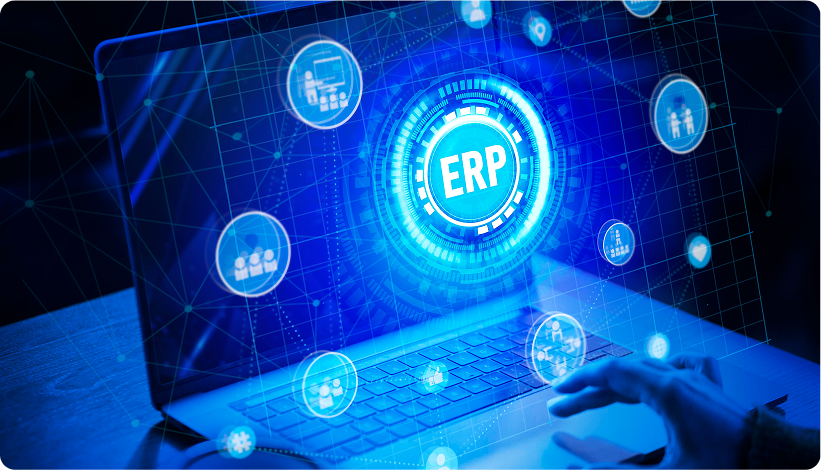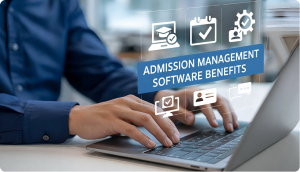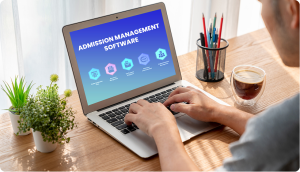
Imagine this: It’s the first week in a new academic year. Admissions are still ongoing, timetables are still changing, fee collections are ongoing, and parents are calling for progress reports. Teachers are still working on producing lesson plans while juggling paperwork, and the principal is immersed in reports that are already obsolete.
For most educational institutions, such chaos is a regular part of their day.
Imagine you have one system that knows your processes, aligns with how your institution operates, and scales with your growth. That is what a Custom ERP System can provide.
Today, where every school, college, and university does everything differently, an ERP that fits every institution does not quite work. Customization is what brings better functioning, better decision-making, and an interconnected experience for students, staff members, and parents.
This blog will explore what Custom ERP stands for, why it is needed by educational institutions, what it offers, and how to choose the most suitable one.
What is a Custom ERP System for Educational Institutions?
A Custom ERP system for Educational Institution is an industry-specific software platform tailored to handle and centralize the diverse academic and administrative activities of an institution, but with one difference, it can be customized according to your specific needs.
Unlike pre-configured ERP offerings that make you change your processes to align with software, your Custom ERP System is created (or configured) to align with your workflows. This might involve everything from creating a custom admissions process to interfacing with district government education portals or even handling multiple languages to accommodate your diverse student base.
For example, an intermediate university with several campuses would require highly advanced scheduling within colleges, whereas individual parent correspondence and fee tracking would come most into focus for a private school. Both need ERP software, but they are completely different. They do not end up with unwanted functionalities or without significant ones by virtue of offering customization.

Why Educational Institutes Need Customized ERP Solutions
Every educational institution operates differently. Even among schools in the same city, differences in curriculum, administrative hierarchy, policies, and scale are significant. Here’s why customization is critical:
Processes are not standard – A distance-learning university’s attendance tracking is distinct from that of a school where attendance is very strict.
Regulatory compliance varies – Institutions must follow local, state, or national education policies, and these can change frequently.
Student and parent expectations are evolving – Today’s digital-native students and tech-savvy parents expect real-time updates, intuitive interfaces, and seamless communication.
Scalability is important – A mature institution will soon outpace an immutable ERP solution. Scaling without customization is costly and disruptive.
A Custom ERP System, in essence, enables institutions to shape technology according to their culture, organizational design, and mission, not vice versa.
Benefits of Custom ERP Solutions for Schools & Colleges
Tailored to Fit Your Institution’s Unique Needs
Two institutions are never alike. A Custom ERP System can match your specific admission process, grading standards, or communication workflow.
For example, where points-based grading is used as an alternative to marks at your school, the ERP can adapt and reduce staff and student confusion.
Easy to Add or Remove Modules
With customization, you begin with the basics and add modules as your needs grow. This is a modular setup where you won’t pay for functionalities that you are not using today but remain prepared for expansion in the future.
Custom User Roles & Permissions
Different users require different levels of access. Lecturers may need to upload marks, fee information is processed by those in the finance department, and principals get consolidated reports. Role-based permissions in a Custom ERP System provide each individual with only what is pertinent to them, boosting efficiency as well as security.
Personalized Dashboards
Rather than generic dashboards, customization enables stakeholders to see KPIs, alerts, and information most important to them.
Example: A school administrator can view broad trends in attendance, but an instructor can only review performance from their class.
Customized Reports & Analytics
Pre-built reports do not always provide answers to your specific queries. Customization lets you create reports tailored to your requirements, such as exam results by subject or fee payment trends by semester.
Custom Attendance and Timetable Features
From biometric integration to flexible scheduling for part-time courses, attendance and timetable features can be shaped to fit your academic model.
Support for Local Policies and Languages
For multi-lingual areas or regions where there are special education laws, a Custom ERP System can include localized language interfaces and policy-oriented modules to help meet compliance and accessibility.
Scalable for Multiple Campuses or Branches
Custom ERP design enables hassle-free handling of information between sites, yet maintains campus-specific workflows.
Improved Data Privacy with Role-Based Access
By regulating who can see what information, institutions reinforce privacy and help mitigate data breach risks — one of today’s biggest concerns in the online education space

How to Choose the Right ERP Solution for Your Institution
Investing in a Custom ERP System is a big decision, and not one to rush. Choosing the wrong system can create more problems than it solves, but the right one can transform the way your institution operates. Here’s a step-by-step guide to help you make a smart, confident choice.
1. Understand Your Institution’s Specific Needs
Every institution has its own priorities. Some want to improve fee collection, others need better communication with parents, and some focus on streamlining examinations.
- Tip: List all your pain points and must-have features before talking to vendors
- Example: If your institution runs multiple evening batches, make sure the ERP can handle flexible timetable management.
2. Choose a Provider That Delivers True ERP Customization
Many ERP providers advertise “customization” but only offer minor differences. A true custom ERP solution should be tailored to your specific needs, covering workflow modifications, module additions or changes, personalized dashboards, and even custom language support, ensuring the system works exactly the way your business expects.
- Tip: Ask for real examples of customizations they’ve done for other institutions.
3. Check for All Essential Modules
Make sure the ERP covers your core processes:
- Admissions
- Fee management
- Examinations and grading
- Attendance tracking
- Timetables
- Library
- Transportation (if applicable)
Having these built in reduces the need for multiple disconnected tools.
4. Ensure User-Friendliness for Everyone
An ERP system is only effective if people use it. If it’s too complicated, staff may avoid it or fall back to manual processes.
- Tip: Ask for a live demo and let actual staff members try it before committing.
- Example: Teachers should be able to upload grades in minutes, not hours.
5. Prioritize Cloud-Based and Mobile Access
Education no longer happens only within the walls of a classroom. Cloud access ensures staff, students, and parents can connect from anywhere, while mobile apps make updates and communication faster.
- Example: A parent should be able to check their child’s attendance in real time from their phone.
6. Ensure Seamless Integration with Existing Systems
If you already have finance software, learning management systems, or biometric attendance devices, make sure the ERP can integrate with them. This avoids duplication of work and data.
7. Confirm Strong Data Privacy and Security
Educational data includes sensitive information about students, parents, and staff. Look for:
- Role-based access control
- Data encryption
- Regular backups
- Compliance with local data protection laws
8. Ask About Training and Ongoing Support
Even the most advanced ERP is useless if your team doesn’t know how to use it. Ask vendors about:
- Onboarding training for staff
- Ongoing technical support
- Response time for issues
9. Compare Pricing and Long-Term Value
Don’t just look at the upfront cost. Consider:
- License fees
- Customization charges
- Annual maintenance
- Upgrade costs
Sometimes, a slightly higher investment upfront saves more money in the long run.
10. Involve Multiple Stakeholders in the Decision
Your ERP will be used by management, teachers, administrative staff, and possibly students. Include representatives from each group in the decision-making process. This ensures you choose a system that works for everyone.
Edumate – Custom ERP Software for Educational Institutions
If your institution is ready to embrace the benefits of customization, Edumate offers a powerful, flexible, and user-friendly Custom ERP System designed specifically for educational environments.
With the ability to adapt modules, dashboards, workflows, and reports to your exact needs, Edumate ensures smooth operations whether you run a single school or a multi-campus university. It supports local policies, multiple languages, role-based access, and scalable architecture, making it a future-ready solution for institutions aiming to grow without compromise.
Final Thoughts
A Custom ERP System is no longer a luxury for educational institutions, it’s a necessity for efficiency, compliance, and growth. With technology tailored to your exact needs, you can focus more on delivering quality education and less on administrative headaches.
If you’re ready to streamline operations, enhance communication, and future-proof your institution, Edumate is your perfect partner in building a truly customized ERP experience. Your institution deserves a system as unique as its vision, contact us today and let’s make it happen.
FAQs
What makes a Custom ERP System different from a regular ERP?
A regular ERP comes with fixed features and workflows. A Custom ERP System is tailored to your unique processes, policies, and goals.
Is custom ERP software suitable for small schools?
Absolutely. Customization ensures you get only the features you need, making it cost-effective for smaller institutions.
How long does it take to implement a custom ERP solution?
Implementation time depends on the complexity and level of customization, ranging from a few weeks to several months.
Does custom ERP software support local policies and languages?
Yes. It can be designed to comply with local education rules and offer multi-language interfaces.





